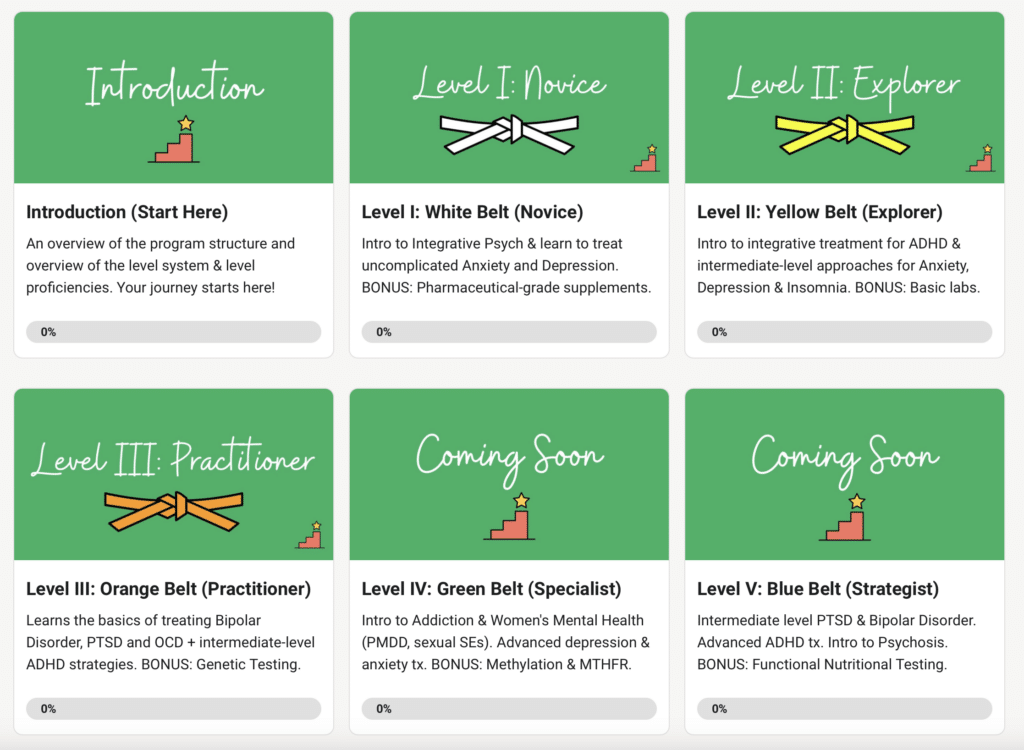If you’re a psychiatrist or mental health provider, you’ve probably felt the urge to offer more than just medications to your patients—but maybe you’ve been held back by feelings of overwhelm, confusion, or that nagging belief: “I don’t know enough to get started.”
Well, let me tell you a secret: You don’t need a fellowship or endless advanced degrees to start practicing integrative psychiatry. In fact, you can begin right now—step-by-step and with confidence.
In this blog post, I will debunk the myths that are holding you back, share actionable steps for getting started, and introduce a structured approach to make learning integrative psychiatry easier, more practical, and instantly applicable to patient care.
What is Integrative Psychiatry?
First, let’s clear up one major misconception:
Myth #1: Integrative psychiatry = anti-medication.
Not true! Integrative psychiatry isn’t about shunning medications; it’s about enriching standard of care psychiatry with additional evidence-based approaches. These tools—like nutraceuticals, mind-body practices, and lifestyle interventions—can:
- Personalize care to each patient’s unique needs.
- Address root causes of symptoms.
- Allow us to be more judicious with medication use.
Integrative psychiatry is a patient-centered philosophy that treats the whole person—mind, body, and spirit—while leveraging all available tools.

Why Learn Integrative Psychiatry in 2025?
The demand for integrative psychiatry is skyrocketing. Patients are increasingly seeking providers who:
- Respect their belief systems.
- Explore holistic approaches alongside medications.
- Take time to address the whole person, not just the diagnosis.
Yet most psychiatrists never learn these tools in their formal training. That’s why, in 2025, there’s never been a better time to learn integrative psychiatry.
But you don’t need to spend tens of thousands of dollars or take years off to “master” it before you start. Let me explain why…
Debunking the Biggest Myths About Learning Integrative Psychiatry
Myth #2: “I need to do a fellowship first.”
Here’s the truth: Fellowships are NOT a prerequisite for practicing integrative psychiatry.
Yes, fellowships teach valuable information, but they often focus on theoretical knowledge instead of practical, immediately applicable skills. Plus, many clinicians pursue fellowships prematurely as a delay tactic, avoiding the real (and sometimes scary) work of applying new tools to actual patients.
As someone who is completely self-taught, I can tell you firsthand: the best way to learn integrative psychiatry is case by case, with real patients.
Start small, apply what you learn, and build from there.

Myth #3: “It’s too hard to know where to start.”
This is so common. Integrative psychiatry can feel overwhelming because there’s just so much information out there. But here’s the key:
You don’t need to learn everything all at once.
Instead, focus on:
- Common conditions first. Start with anxiety and depression, which make up 80% of most psychiatry caseloads.
- High-yield interventions. Learn a few simple tools you can confidently apply in patient care today—like recommending fish oil for mood disorders or N-acetylcysteine (NAC) for OCD.
Myth #4: “I can’t market myself as an integrative provider without a fellowship.”
Wrong again! You don’t need a fancy title to attract patients who are eager for integrative care.
Patients care about:
- Your approach: Are you holistic, compassionate, and evidence-based?
- Your value: What makes you different from other providers?
When marketing yourself, focus on transparently communicating how your integrative approach benefits patients. You don’t need to know everything—you just need to know enough to help your ideal patient and share that clearly.
In my mentorship program, Dream Practice Academy, I guide providers through one of the most important early steps: crafting their Unique Selling Proposition (USP). Your USP highlights what sets you apart as a psychiatrist and communicates the unique value you bring to patient care. Developing this early on is essential for building a successful private practice and attracting your ideal patients.

If you’re ready to uncover your own USP, I provide a step-by-step framework in the Marketing module of my Free Dream Practice School community. You can join and get started here.
How to Start Learning Integrative Psychiatry
1. Take a Structured, Step-by-Step Approach
The key to learning integrative psychiatry without overwhelm is to follow a structured system—one that starts with foundational tools and builds up to more advanced strategies.
This is exactly why I created the Integrative Psychiatry Incubator: a high-yield training system that allows you to:
✅ Learn step-by-step, starting with anxiety and depression.
✅ Gain practical skills you can use immediately.
✅ Build confidence while treating real patients.
The Incubator is designed like a karate belt system. You start at the “white belt” level with basic tools and concepts. As you build competency, you move to higher levels with more advanced skills—just like mastering karate moves before you start sparring.

Click here to learn more and join the Integrative Psychiatry Incubator.
2. Start with High-Yield Interventions
When learning integrative psychiatry, it’s easy to feel overwhelmed by the sheer number of tools and techniques available. But here’s the secret: you don’t need to know everything to make a meaningful impact. Starting with high-yield interventions is the best way to build confidence and see results.
Here are some examples of simple yet effective integrative interventions:
- Vitamin B12 and folic acid testing: Useful for patients with fatigue, mood issues, or brain fog.
- Fish oil: Effective for mood disorders, ADHD, and depression.
- N-acetylcysteine (NAC): Evidence-based for OCD and anxiety with obsessive behaviors.
These interventions often amaze patients because they go beyond what they’ve typically encountered in traditional care. A patient who’s used to being offered only medication may feel seen and valued when their provider takes a deeper dive into lab tests or holistic options.
The key is to focus on bread-and-butter psychiatry—conditions like anxiety and depression that make up the majority of most practices. As you gain confidence, you can layer on more advanced techniques, always ensuring the interventions resonate with the patient’s goals and values.

3. Learn While Treating Real Patients
The most effective way to learn integrative psychiatry is to apply what you learn in real time. Each patient you see becomes an opportunity to:
- Test new tools and interventions.
- Refine your skills.
- Build confidence.
When I started my private practice, I didn’t have an extensive integrative psychiatry knowledge base. Instead, I learned case by case. Before a new patient appointment, I’d spend a few days researching evidence-based holistic approaches specific to their condition.
Pro Tip: I also relied heavily on trusted integrative psychiatry books as references. Check out my favorites here.
The goal wasn’t to do everything—just enough to create a thoughtful plan aligned with the patient’s beliefs and needs. For example, optimizing something simple like vitamin D levels or recommending mindfulness practices often amazed patients who’d only ever been offered medication.
This approach taught me that integrative psychiatry is about focusing on high-yield, personalized interventions and building trust through dialogue. Every patient interaction became a learning opportunity, helping me grow while improving patient care.
4. Join a Supportive Community
Learning integrative psychiatry can feel isolating, especially if you’re surrounded by colleagues who misunderstand it as “alternative” or “anti-medication.”
That’s why it’s so important to join a community of like-minded providers—people who all share the same goal of starting an integrative psychiatry private practice.
My Free Dream Practice School community is the perfect place to network and connect with 3.5k+ other psychiatric providers looking to build a private practice. Inside this community you’ll also find tons of valuable resources such as my high-yield integrative protocols, my 12-month private practice timeline, my private practice audit, and more!
The Future of Psychiatry is…
2025 is the year to step into a new way of practicing psychiatry—one that’s patient-centered, holistic, and deeply rewarding.
You don’t need to wait until you “know everything.” You just need to take the first step. With the right tools, mindset, and support, you can start offering life-changing integrative care to your patients while building a practice you love.
If you’re inspired to dive into integrative psychiatry but don’t know where to start, I’ve got you covered. Inside my free Dream Practice School, you’ll find high-yield protocols, including my go-to strategies for Bipolar Disorder and Long COVID Brain Fog, as well as other invaluable resources to kickstart your learning journey.
You can also follow me on Instagram @thepsychiatrymentor, and on YouTube The Psychiatry Mentor for more valuable private practice and integrative psychiatry tips and resources.
I hope to connect with you soon.
Want a clear, step-by-step plan for building your dream private practice (without the overwhelm)? Grab the free Private Practice Roadmap by answering a few quick questions below. It’ll help you get clarity on your next best steps, avoid common early mistakes, and start creating a practice that actually fits your life and values.


[…] If you’d like to explore the differences between traditional and integrative psychiatry further, I’ve written about it here. […]